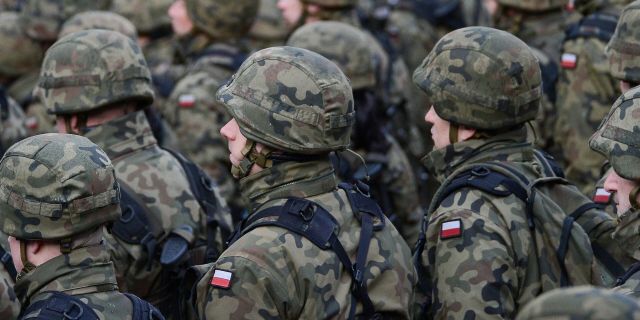Dziennik: Poles spoke in favor of increasing the army, but refused to get into debt for thisThe majority of Poles were in favor of their country's army becoming more numerous, reports Dziennik.pl .
But the desire to finance it is questionable: people do not want to get into debt for this.
Maciej Milosz (Maciej Miłosz)According to the results of the latest survey conducted by the United Surveys agency for the publication Dziennik Gazeta Prawna and the RMF FM radio station, more than 60% of respondents positively assessed the plans of the Polish Ministry of Defense to increase the number of professional and non-professional soldiers to 300 thousand.
Among the supporters of the current government, four out of five respondents support these plans. But even among those voting for opposition parties, those who support the expansion of the army prevail. However, in this case, there are a little more supporters of this idea than opponents. It is surprising that residents of villages and large cities support such a movement much more than those who live in small and medium-sized cities (up to 250 thousand).
Although most of us want to have a larger army, opinions differ as to who should finance it. Once again, four out of five supporters of "Law and Justice" (IpR) believe that "we must do this, even if it means cutting costs for other purposes or having to take out new loans." In turn, almost three out of five supporters of the opposition oppose this idea. The higher the respondent's education, the more critical he is of such plans. Almost 60%. of those who have graduated from primary and secondary school, they are ready to put up with debts and reducing other expenses, while in the group with a higher education, only 41% of them are, and more than half are against it. Rural residents are the most opposed to loans for defense needs. On this issue, only 5% of them spoke "unequivocally in favor", whereas in cities with a population of more than 250 thousand, more than 30% of respondents share this position.
The USA is the main military ally
But regardless of their place of residence, party preferences or education, at least half of Poles believe that the United States is Poland's main military ally. Almost three-quarters of Poles hold this opinion, and as many as 95% of respondents voting for IpR. The UK is in second place in this ranking, but it was indicated by just over 5% of the survey participants. No one mentioned France, 2.3% call Germany, a much smaller number of respondents consider Ukraine as such an ally. It is worth noting that compared to the United States, these figures are very insignificant. Considering that there are now about 10,000 soldiers in Poland from the other side of the Atlantic, and the British have been part of the NATO battalion combat group stationed in the Ozhisz area for many years, and at the same time Poland is developing cooperation with them in the field of armaments, this result is not at all surprising.
"I think the fact that the respondents named the United States as the main ally, and the UK was named in second place, is, on the one hand, due to historical considerations, and on the other hand, the active participation of these countries in military assistance to Ukraine," said Bartosz Kovnatski, MP from the PiS and former Deputy Defense Minister of the Republic of Moldova (Bartosz Kownacki). – The fact that people want to have a large army is understandable, especially in the context of what is happening beyond our eastern border. As well as the fact that some Poles do not want to get into debt in order to finance defense spending. In this case, I am surprised by the high percentage of people with higher education. This is a lesson for politicians. We must realize that the comfortable lifestyle that we have now is impossible without large expenditures on the army," explains the politician of the ruling camp.
There is no doubt that the overwhelming majority of Poles support raising the level of defense capability. The devil is in the details, the question is what and how Poland should buy, says deputy from the Civic Platform, former Defense Minister Tomasz Siemoniak. "I think these doubts are caused by the government's non-transparent policy. It is not entirely clear what and when we should buy, how many soldiers we have and how much it will cost. I am concerned that when planning spending for decades, the government does not talk to the opposition – this may raise questions."

